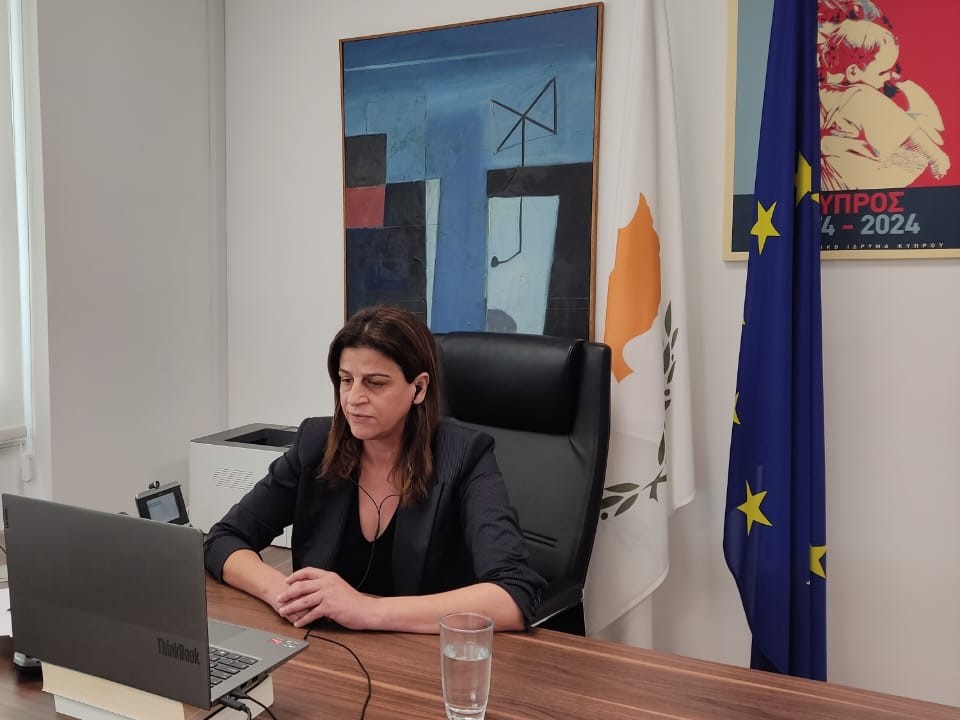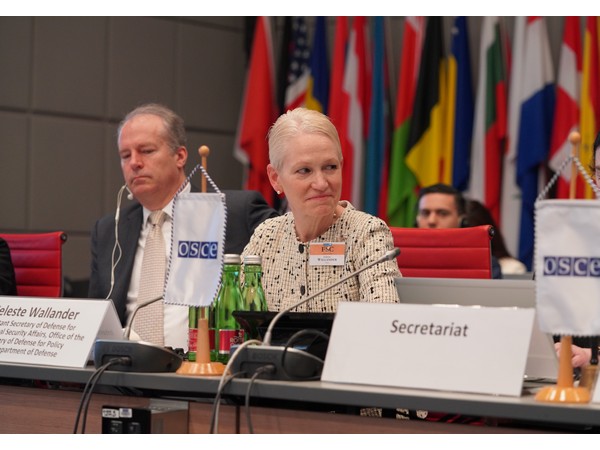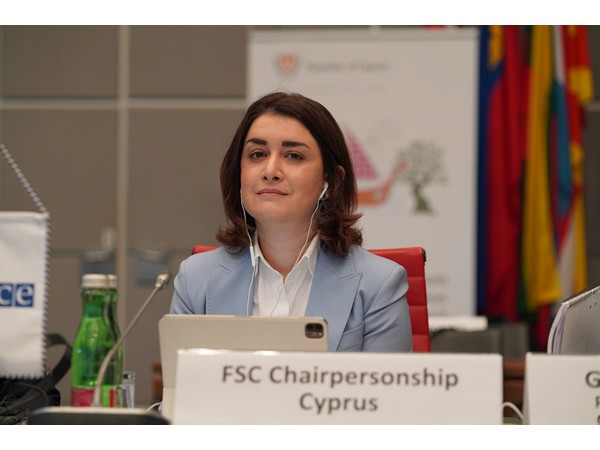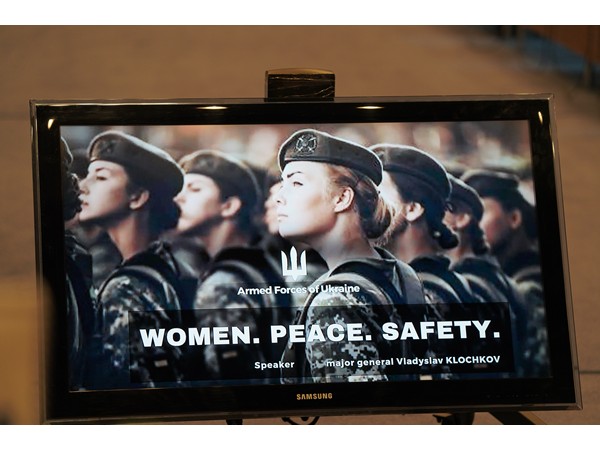Press Releases
06-03-2024 17:02
Opening Remarks by Commissioner for Gender Equality, Ms. Josie Christodoulou, at the Forum for Security Co-operation Security Dialogue on Women, Peace and Security
“Integrating Gender Perspective when fulfilling the OSCE politico-military commitments and activities”
First and foremost, I congratulate the Cyprus Chairpersonship of the FSC for the initiative to organise this interactive dialogue. Such initiatives confirm Cyprus’ commitment to accelerate efforts towards gender equality. At the same time, it is an initiative which is unfortunately timely with ongoing conflicts, including those in our vicinity: the conflict in the Middle East and the Russian war of aggression against Ukraine, where women and children are being used as shields and weapons of war. Women and children have been kidnapped, raped, and have fallen victims of human trafficking for labour and sexual exploitation.
Within the framework of today’s opening remarks, allow me to say a few words about Cyprus’ efforts. Gender equality is one of the main horizontal priorities of the Cyprus government. Towards this direction, we are making new efforts through the use of the tool of gender mainstreaming in a horizontal and holistic manner in all Ministries and Deputy Ministries for the first time. These efforts come with the new strategy for Gender Equality 2024-2026. At the same time, Cyprus is also implementing a National Action Plan on Women Peace and Security 2020 - 2025.
Both the Strategy and the Action Plan are designed in such a way that gender is steadily mainstreamed at two levels simultaneously:
- Within Ministries and Deputy Ministries, in order to create and sustain a gender- friendly environment, and secondly
- By mainstreaming a gender perspective into Ministries’ policies, activities and projects. Within these efforts, actions in relation to mainstreaming gender in diplomacy, security and defense could not be absent.
I would like to underline that diplomacy is pushing for peace. Peace diplomacy is as necessary as ever.
But peace cannot come without women in leadership positions. Recognising this, one of our own promising examples is the fact that the President of the Republic of Cyprus, Mr. Nikos Christodoulides, appointed a total of almost 39% female Ministers and Deputy Minsters. When it comes to diplomacy, we are more actively mainstreaming gender within our foreign policy, whereas 53% of voluntary financial support to multilateral organisations goes to programmes related to the empowerment of women and women’s rights. It is in this context, that as of this year, Cyprus is financially contributing to the OSCE’s WIN Project. At the same time, more women have been appointed to leading positions within the Ministry of Foreign Affairs, while women head Cyprus key diplomatic missions.This example is now on its way to be implemented in different settings in our country, including the security and defence sectors. More specifically: A Military Advisory Council for the Promotion of Gender Equality is set by the Ministry of Defence. The Council is made up of three women and two men, Officers of the Army. The role of the above Council includes, among others,
(a) Advocacy for gender equality and promoting policies to increase the presence of women at all levels of the Army.
(b) Ensuring that gender specificities are taken into account in the implementation of Army actions.
(c) Encouraging members of the Army to co-operate and contribute to its activities and report on gender equality issues.
(d) Inform members of the Army of the impact of armed conflict on both sexes and the value of women's involvement in conflict resolution and decision-making.
(e) Organise awareness raising seminars and workshops to inform members of the Army on gender equality issues.
At the same time, the Council carries out the tasks of the Gender Equality Committee in the prevention of harassment and sexual harassment in the Army. We aim to set up a similar committee in the National Guard. Furthermore, we have recently developed a Code of Conduct for personnel serving in military and civilian missions with regard to their obligations with respect to the rights of women and girls arriving in Cyprus from conflict zones. Last, in the National Guard, 22 of the 44 female officers serve in key positions that shape decision-making. Female non-commissioned Officers are at 32.6% in the Army and female soldiers with contract are 20.7%.
Ladies and gentlemen,
Peace and security diplomacy within multilateralism is crucial, and through different resolutions with the most known being UN Resolution 1325 Women Peace and Security or better the WPS Agenda, diplomacy is pushing for peace.
As it is well known, the WPS Agenda points out the disproportionate and negative impact of war and conflict on women and girls, including sexual violence and gender-based violence faced by women in a greater extent. At the same time, it recognises the role of women in the prevention of conflicts, resolving and maintaining and (re)building peace. It recognizes the immense need that women should and must participate in peacekeeping processes. The regulatory framework of the Resolution guides us to (re)build peace, just and inclusive societies. Since the Security Council adopted WPS 1325, we have witnessed some success stories for gender equality. While we must pause to celebrate these, at the same time we must recall that we have neither significantly changed the composition of peace tables nor the impunity enjoyed by those who commit atrocities against women and girls. The progress is slow! The resolution was adopted almost 24 years ago and the world-we- still did not manage to implement the resolution in its full. Leaders all over the world must secure the effective participation and inclusion of women in peacekeeping processes.
According to the International Peace Institute, when women participate in peace processes stronger agreements can be formed, and have a rate of success of 35%. Furthermore, these agreements are more likely to last more than 15 years.
Therefore, the active participation of women within the traditional male-dominated security sectors where these issues are addressed is crucial. At the same time, we must reframe gender equality to its basis and make it clear that gender equality is not a competition between women and men.
We must create an environment that will enable women to actively participate in order to use both women’s and men’s diverse experiences as an added value to security and defence to lead to peace. In parallel, we must rethink the way we draft and implement our own plans. We need to implement more specific measures and be accountable for their implementation. At the same time, we should not forget civil society. We urgently need better ways to communicate with civil society and to support women’s movements across the world.
In closing, I would like to underline that now more than ever, it is imperative to deliver on the values and principles outlined by the “Women, Peace and Security” agenda. The world faces alarming security shifts, instabilities and geopolitical tensions and challenges. We witness rapid changes due to advanced technology and cyber warfare that redefine how we should think about security.
Against this backdrop, women’s leadership, and their full, equal, and meaningful participation at all levels of decision-making is essential, and in this direction we are tirelessly working.
(NZ/EP)
Relevant Press Releases











